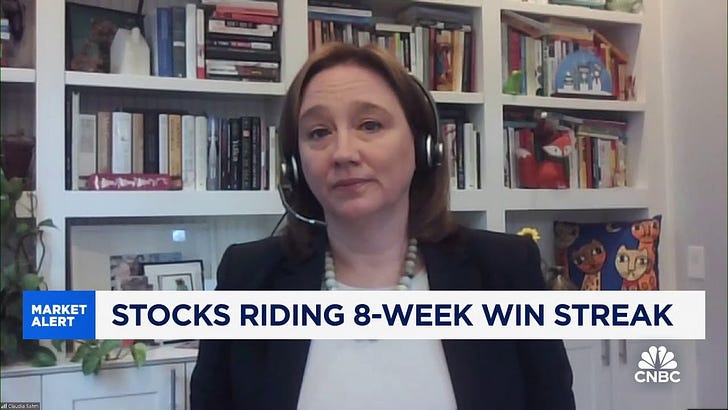This week, I had the privilege to do interviews on CNBC, Yahoo Finance, and Fox Business. Today’s post shares clips from each and some highlights. There are some common themes, though each covers different angles.
Bottom line: 2023 is worth celebrating. Massive disinflation with a full employment economy was supposed to be impossible, or at least that’s what we were told. No, it was always possible, and it happened. Now it’s the Fed’s turn to get out of the way.
Inflation is coming down. The last mile may be the easiest.
Eisen: Do you think it’s a bigger risk at this point that inflation remains sticky and surprises to the upside or to the downside with a D in front of it?
Me: I think the last mile is going to be the easiest of this whole inflation cycle. We’re starting to see, in particular, some of the extraordinary pricing power that businesses have had due to Covid disruptions. We have worked through a lot of Covid disruptions, and really, that’s the last one. And as that starts to unwind, and we’re seeing some of it in discussions about the holiday shopping. Well, that gets us to two. And it could get us there pretty quickly.
Here is the video.
The Fed must look at the data and get out of the way.
Smith: When you think about the Fed getting down to the 2% set target that they’ve put out there, what is the key element, especially within their own data dependency, that is actually going to get them there?
Me: The Fed needs to wake up. They have beaten us over the head that they are data-driven, and they are, but come on, inflation has come down from a peak of 9% to 3%. That is a massive disinflation. I understand they want to see conviction, but what are you looking at? I mean, this is really moving.
And, you know, so I understand. I understand the psychology of the Fed. There was absolutely a case for them to cut in December. I don't expect them to cut until May. And I'm not—I don't really think it matters, frankly, for the soft landing, but it's time for them to get out of the way and look at the data.
Here is the video excerpt and article with the transcript.
Larry Summers was wrong because he refused to see inflation driven by Covid and Ukraine supply disruptions.
Payne: Everyone taking aim at Larry Summers, for instance, for predicting a huge hit to labor? Where did he go wrong?
Me: Larry Summers and many of his peers looked at the inflation that we saw start up in 2021, and frankly really go too high in 2022 and said this was demand, this was the American Rescue Plan. And yet when I looked at that inflation and some of my peers, we said, “No, this is Covid, this is Ukraine,” and so there’s a difference in opinion. If it’s all demand, then we “need” a recession, or we need growth to really slow down. If Covid and Ukraine, we just gotta get out of the mess. And that’s what we saw in 2023. Inflation came down markedly, and unemployment stayed low.
Link to the video here.
PS Larry now admits that supply disruptions were central to this inflation, and the Phillips curve—which is demand-driven and said we “needed” higher unemployment to get inflation down—was not up to the task. It’s nice that we finally agree.
In closing.
It’s been a painful ride since Covid slammed into us, and we turned the corner in 2023.
There are no guarantees for 2024, and we have had an incredible run of bad luck in recent years. Even so, 2023 shows without question that we did not need a recession to get inflation down. It also shows that the American Rescue Plan was worth it. Helping people helps all of us, and that’s what we did. Keep pushing!






The bottom line is to me you don't have to fully agree with Claudia Sahm or even MMT for that matter but both are right about one thing is that outdated macro took a backseat and the economy didn't need a recession. I agree that who knows what 2024 might bring us and obviously its an election year but as far as 2023 is concerned, people like Claudia along with the MMT community were right. Hope everyone has a nice and safe 2024.
Maybe more economists need to come from producing parts of the country. Then they might understand what it takes to resolve supply disruptions. Claudia's background has lived this.
If one misses a planting season or harvesting period or ..., then it takes a full cycle (which might be a year) to resolve. With just-in-time inventory systems, then 'catching up' is even harder as this is a fragile system (i.e., minimal supply inventory). Means excess production to make up. Can one say "inflation causing"? But is it permanent? Not likely but transitory might be longer than is yet understood.